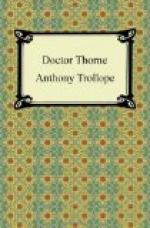‘I hope Augusta likes him,’ said Frank to himself, arguing on the subject exactly as his father had done; ’but for an engaged lover he seems to me to have a very queer way with him.’ Frank, poor fellow! who was of a coarser mould, would, under such circumstances, have been all for kissing—sometimes, indeed, even under other circumstances.
Mr Moffat did not do much towards improving the conviviality of the castle. He was, of course, a good deal intent upon his coming election, and spent much of his time with Mr Nearthewinde, the celebrated parliamentary agent. It behoved him to be a good deal at Barchester, canvassing the electors and undermining, by Mr Nearthewinde’s aid, the mines for blowing him out of his seat, which were daily being contrived by Mr Closerstil, on behalf of Sir Roger. The battle was to be fought on the internecine principle, no quarter being given or taken on either side; and of course this gave Mr Moffat as much as he knew how to do.
Mr Closerstil was well known to be the sharpest man at his business in all England, unless the palm should be given to his great rival Mr Nearthewinde; and in this instance he was to be assisted in the battle by a very clever young barrister, Mr Romer, who was an admirer of Sir Roger’s career in life. Some people in Barchester, when they saw Sir Roger, Closerstil and Mr Romer saunter down the High Street, arm in arm, declared that it was all up with poor Moffat; but others, in whose head the bump of veneration was strongly pronounced, whispered to each other that great shibboleth—the name of the Duke of Omnium—and mildly asserted it to be impossible that the duke’s nominee should be thrown out.
Our poor friend the squire did not take much interest in the matter except in so far that he liked his son-in-law to be in Parliament. Both the candidates were in his eye equally wrong in their opinions. He had long since recanted those errors of his early youth, which had cost him his seat for the county, and had abjured the De Courcy politics. He was staunch enough as a Tory now that his being so would no longer be of the slightest use to him; but the Duke of Omnium, and Lord de Courcy, and Mr Moffat were all Whigs; Whigs, however, differing altogether in politics from Sir Roger, who belonged to the Manchester school, and whose pretensions, through some of those inscrutable twists in modern politics which are quite unintelligible to the minds of ordinary men outside the circle, were on this occasion secretly favoured by the high Conservative party.
How Mr Moffat, who had been brought into the political world by Lord de Courcy, obtained the weight of the duke’s interest I never could exactly learn. For the duke and the earl did not generally act as twin-brothers on such occasions.




